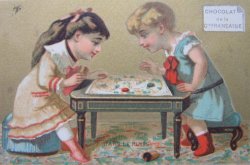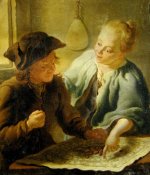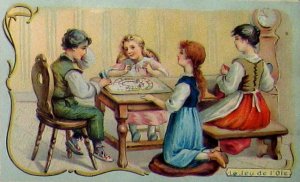Giochi dell'Oca e di percorso
(by Luigi Ciompi & Adrian Seville)
(by Luigi Ciompi & Adrian Seville)

|
Giochi dell'Oca e di percorso
(by Luigi Ciompi & Adrian Seville) |

|
 |

Torna alla ricerca giochi (back to game search) |
 |
| Joc per a les Eleccions | ||
 |
Versione stampabile
 |
Invia una segnalazione

|
            |
primo autore: | Moncau Vilà |
| secondo autore: | Moncau Vilà | |
| anno: | 1983 | |
| luogo: |
Spagna-Olot |
|
| periodo: | XX secolo (3°/4) | |
| percorso: | Percorso di 63 caselle numerate | |
| materiale: | carta (paper) (papier) | |
| dimensioni: | 390X600 | |
| stampa: | Offset a tre colori | |
| luogo acquisto: | Spagna-Barbastro | |
| data acquisto: | 05-02-2000 | |
| dimensioni confezione: | ||
| numero caselle: | 63 | |
| categoria: | Politica, satira, fatti di cronaca | |
| tipo di gioco: | Gioco di percorso | |
| editore: | Convergència i Uniò | |
| stampatore: | Alzamora A/C S. A., Olot | |
| proprietario: | Collezione L. Ciompi | |
| autore delle foto: | L. Ciompi | |
| numero di catalogo: | 2515 | |
| descrizione: |
Gioco di 63 caseòòe numerate, spirale, antiorario, centripeto. REGOLE: a destra sul tavoliere. CASELLE: mute. REFERENZA 1 Joan Vila Moncau (Vich-1924, Olot-2013), es un pintor español. Estudió primero en Vich, después en la Escuela Llotja de Barcelona y finalmente en la École du Louvre, de París en 1954. Especializado en la pintura mural, ha hecho obras de este tipo en Vich, Olot, Seo de Urgel y Ripoll. Participó en los Salones de Octubre de Barcelona y los Salones de Mayo. Expuso a menudo integrado en el grupo Els Vuit de Vic (Los Ocho de Vich), e individualmente, en Sabadell (1957), Madrid (1962), Vich (1962 y 1964), Barcelona (1967 y 1975) y Figueras (1974). Desde 1970 ha sido director de la Escuela de Bellas Artes de Olot. Su estilo es una modernización del realismo más fiel, especialmente centrado en paisajes urbanos, pero también ha ensayado el surrealismo. En 1991 recibió la Cruz de San Jorge. REFERENZA 2 Convergenza e Unione (Convergència i Unió) è stata una federazione (e prima una coalizione) di partiti politici attiva in Spagna nella comunità autonoma di Catalogna dal 1978 al 2015. La componevano: - Convergenza Democratica di Catalogna (CDC), di ispirazione liberal-democratica; - Unione Democratica di Catalogna (UDC), di matrice cristiano-democratica. (Wikipedia) - (Wikipedia) (22/02/2018) REFERENZA 3 A Brief History of Convergència i Unió Convergència i Unió was a federation of two political parties comprising the liberals of Convergència Democràtica de Catalunya (CDC) and the Christian democrats of Unió Democràtica de Catalunya (UDC). CiU only existed as a federation from 2001 to their break up in 2015 but the two parties had stood together in elections as a coalition since September 1978. CiU governed Catalonia, under President of the Generalitat Jordi Pujol, continuously from 1980 to 2003 and were in power from 2010 to 2015. In the elections for the Parliament of Catalonia of November 2003, the historic leader and founder of Convergència, Jordi Pujol, stood down as candidate for the Presidency of the Generalitat in favour of Artur Mas. The federation won most seats but with only 46 deputies they were a long way from a majority in the 135-seat chamber and, with no obvious coalition partners, were unable to form a government. As a result, the Tripartit coalition of PSC, ERC and ICV-EUiA occupied the Palau de la Generalitat under socialist President Pasqual Maragall. In the Autonomic Elections of November 2006, Artur Mas stood for President of Generalitat again and CiU's campaign slogan was "Estimar Catalunya, governar bé!" - "Love Catalonia, govern well!" This time CiU not only won most seats with 48 but also polled most votes with 31.5% of the Catalan electorate voting for them but once again didn't have a majority. Although they attempted to ally with ERC, the Republicans decided to join PSC and ICV in the Tripartit again, which this time formed a government under President José Montilla. Finally, in the Autonomic Elections of November 2010, CiU with 62 seats out 135 were able to form a government and Artur Mas became President of the Generalitat for the first time. However, this was only possible with the support of the Partido Popular. CiU candidate, Xavier Trias became Mayor of Barcelona in the municipal elections of July 2011 and for the first time since the return of democracy, the federation controlled both the Catalan Parliament and the capital. In the general elections of November 2011, Convergència i Unió won 16 seats and became the biggest Catalan party in Congress ahead of PSC for the first time and former Unió leader Josep Antoni Duran i Lleida was president of the CiU group in the Spanish Parliament. The Diada demonstration of September 11th 2012 in favour of independence for Catalonia led Artur Mas to call Autonomic Elections for November 25th of the same year and despite being the largest party in the Catalan Parliament, the number of CiU seats dropped from 62 to 50. Artur Mas was still able to form a government by promising to call a referendum on Catalan independence before the end of 2014 and thereby counting on the support of Esquerra Republican de Catalunya (ERC), the main opposition party. The last legislature was marked by difficult relations with central government in Madrid due to the Catalan independence process and financial restrictions which have led to cuts in services in Catalonia. The admission of former leader Jordi Pujol that he had undeclared money in bank accounts in Switzerland and Andorra in the summer of 2014 not only caused an internal crisis in the party but also left them open to attacks from other parties. CiU were under the shadow of corruption accusations for a number of years with a major case known as the Cas Palau and charges against former ministers Macià Alavedra and Lluís Prenafeta in addition to the Pujol scandal. However, given that CiU were the only centre-right option for Catalanist voters and the left-wing vote was to be split amongst a number of parties, the federation managed to weather the storm during the municipal elections of May 2015. The situation was more difficult to predict for the early elections to the Parliament of Catalonia, which Artur Mas has called for September 27th 2015 and which, in theory, acted as a proxy referendum on Catalan independence. Artur Mas and Convergència were playing a strong pro-independence card and this had already led to differences of opinion within the CiU federation, particularly with former Unió leader Josep Antoni Duran i Lleida. On June 15th 2015, following Unió's internal consultation on Catalan independence, which was narrowly won by the leadership's unionist bloc, Convergència and Unió decided to stand separately for the forthcoming elections and the stable political formation, which had laster for more than 35 years officially split. (Barcelonas) (22/02/2018) |
|
| bibliografia: | ||
Vai alla ricerca giochi Vai all'elenco autori